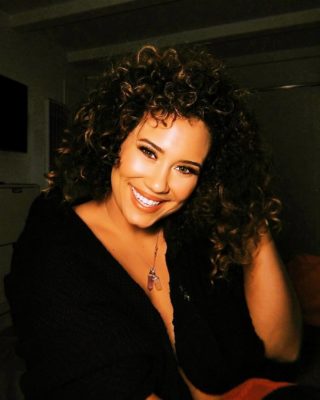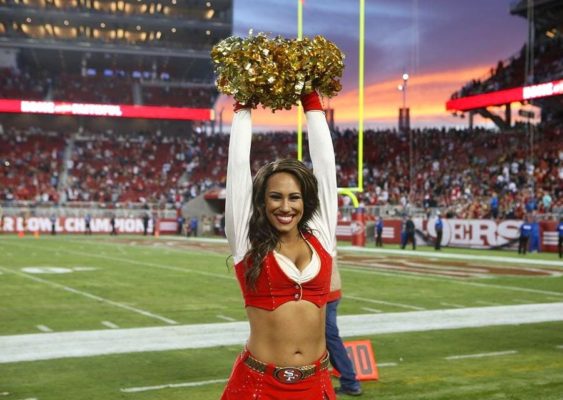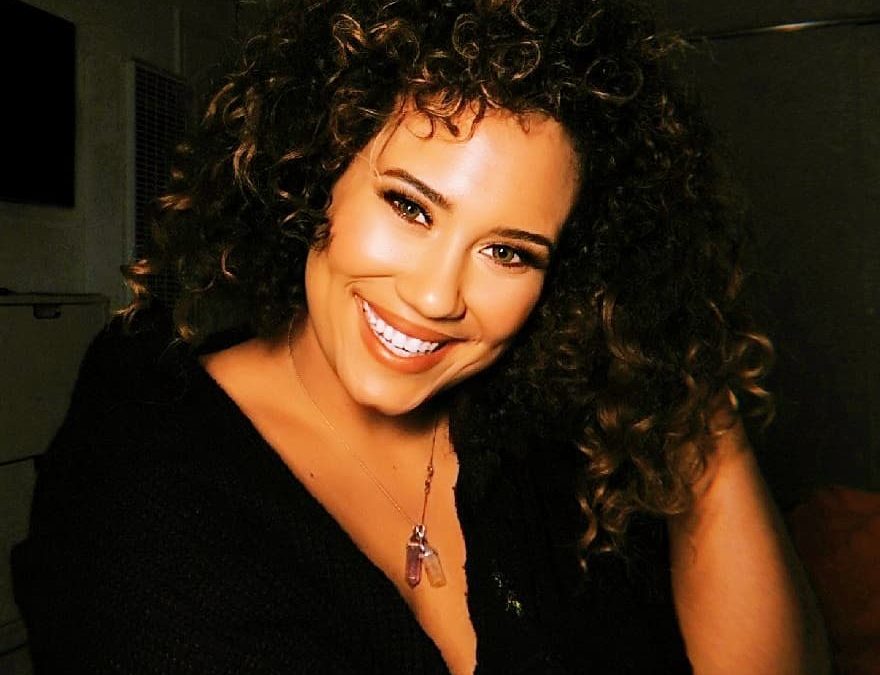 Next on our Keeping Up With the Science Cheerleaders blog series is Kayla! Last time we featured her in 2016, she was working toward her Master’s in Sports Psychology and was cheering for the San Francisco 49ers. She just graduated with her Doctorate in Clinical Psychology, so we thought this was the perfect time to catch up with her!
Next on our Keeping Up With the Science Cheerleaders blog series is Kayla! Last time we featured her in 2016, she was working toward her Master’s in Sports Psychology and was cheering for the San Francisco 49ers. She just graduated with her Doctorate in Clinical Psychology, so we thought this was the perfect time to catch up with her!
What’s new since we last talked to you?
Oh man, a lot is new! I retired from cheering in the NFL. I cheered for the 49ers for 6 years. As I entered retirement, I shifted my focus to my professional career by obtaining my doctorate in Clinical Psychology and expanding my dance business, Sassy Hip Hop With Shabre. Due to the pandemic, I’ve been teaching virtual dance classes, which have been a huge success for my business as I am able to reach sassy hip hoppers from all over the world! I also started a Sassy Pro Prep program where I teach a weekly pro prep class to virtually prepare dancers for pro teams. As a 49ers cheerleader, I loved creating choreography for my solo at auditions. I now enjoy creating solos for other dancers auditioning for professional dance teams.
This past year, I’ve had the privilege of choreographing for the Golden State Warriors Dance Team, the Oakland Raiderettes, and the 49ers Gold Rush alongside Oscar Hernandez. Oscar and I choreographed the Raiderettes last home game performance at the Oakland Coliseum! It was such a dream come true and honor to be a part of history as a Bay Area native.
 When did you finish your dissertation? Tell us about your research.
When did you finish your dissertation? Tell us about your research.
I finished my dissertation in April 2020. My dissertation research question was: “How do retired professional cheerleaders adjust to retirement?” I conducted interviews with retired professional cheerleaders and asked them questions related to their retirement experience. I then found common themes among the answers and used those themes as reported data. The main findings are that many retired professional cheerleaders essentially experience an identity crisis in retirement, as well as feel a sense of loss of belongingness. Retired professional cheerleaders also experience “FOMO” (fear of missing out) when they see active cheerleaders posting content on social media and sharing their fun experiences on their team.
[Editor’s note: I participated in Kayla’s dissertation research and think these findings are really interesting. When I retired, I also went through a little bit of an identity crisis because I had cheered professionally for seven years. When you no longer have that time commitment of feel part of that community, it feels like “now what?” Luckily, being involved with the Science Cheerleaders helped alleviate that for me.]
Additionally, many retired professional cheerleaders have difficulty finding motivation for health and fitness goals in retirement. Retired cheerleaders also reported that their reasoning behind retiring is due to wanting to have more free time to focus on their careers, as well as spend more time with their family and friends. As an active cheerleader, you have a very time-consuming schedule. You’re around your teammates a lot and they become your family. This is why retired cheerleaders feel a loss of belongingness and experience an identity crisis in retirement.
What can we due to ease the transition into retirement and resolve the identity crisis that many experience?
One of the best things professional cheerleaders can do to ease into the transition of retirement is to build a strong support network of friends and family. It’s also helpful for cheerleaders to reflect on what makes them happy and the hobbies they have outside of dance and delve into that. It’s very common for professional cheerleaders to get so wrapped up in the time-consuming schedule and demands of a professional cheerleader that they lose themselves in the process. When this happens, they may focus less on the things they enjoyed doing before cheerleading. For example, when I transitioned into retirement, I realized that my mind and body were programmed for 6 years to be on a pro cheer time schedule. So I replaced my normal pro cheer rehearsal time with things that made me happy such as, swimming, painting, choreographing, and running. The more I tapped into the things that made me happy, the closer I felt I was getting to my true authentic self and identity.
This is the first time professional cheerleaders have been used as a study population right? Why did you choose this population?
Yes, my dissertation is the first study ever in the world to conduct research on professional cheerleaders. I chose this population because, as a rookie and second year vet on the team, I started observing professional cheerleaders in retirement as they helped at game days and events. I started noticing that there were some observable differences in the way they were as an active cheerleader versus in how they were in retirement. For example, I noticed that some women in retirement were less confident, more anxious, less social, and grieving the loss of identity as a professional cheerleader. I chose my dissertation topic my third year on the 49ers and was writing my dissertation while on the team. I quickly became really passionate about bringing awareness to the professional cheerleader population because I knew there was something about the transition into retirement that needed to be explored and brought to light.
What are your career goals and how does your Doctorate fit in?
I have my Master’s degree in Sport Psychology, and now that I have my Doctorate in Clinical Psychology, I want to work with athletes and clinical mental health professionals as a Sport Psychologist. I plan to continue choreographing for professional NFL/NBA dance teams, become a director for a professional dance team, and open a private practice in the Bay Area to work with athletes, adults, and teenagers as a sport psychologist. I plan to continue expanding Sassy Hip Hop With Shabre and to provide mental health sport psychology seminars to dance teams. I essentially plan to continue integrating being a choreographer and psychologist into my career.
Did you learn anything unexpected while completing your dissertation?
I was really surprised to see that the majority of participants all had similar responses to the interview questions. This made my job a lot easier when I was finding common themes in the data. I was also surprised at how well I was able to not share my personal experiences with the participants in the interview. As a researcher, I had to not interact with participants in the way I normally would have in a casual conversation. For example, if a participant shared a retirement experience, I was unable to say “me too!” or “the same thing happened to me!” I was only allowed to ask further questions based on the content they provided in the interview because I did not want to distort data.
How do the qualities that made you a great cheerleader benefit you in your STEM career?
I always say that the 49ers Gold Rush raised me because I joined the team when I was just 19 years old! The team instilled values within me that have allowed me to carry myself with poise and confidence. I used to be terrified of public speaking! However, when you’re a professional cheerleader, you learn to get comfortable with public speaking because it’s a part of the job and within everything you do as a cheerleader. Overall, Gold Rush taught me how to light up a room when I walk in. I learned how to speak with poise, dress with style and class, be confident in who I am, be my true authentic self, bring light and love to this world, and ultimately, be a superwoman in and out of uniform. Gold Rush helped me discover my light, share my light with the world, and see that everyone is unique and has a superpower. Therefore, I help clients discover their light and superpower in therapy, so that they can share their light with others and walk more freely and confidently in this world.

What advice would you give your 12-year-old self?
You’re going to accomplish some of your biggest dreams. Stay focused on the present moment. Don’t stress about the future and what lies ahead. Your actions in the present will set you up for the future. Create goals that you can accomplish today and crush those goals! Before you know it, you’ll look up from all the hard work you’re doing and your dreams will be right in your path.
While more women are pursuing STEM degrees in college, the number of women pursing advanced degrees in STEM is still low. What advice would you give other women interested in pursuing an advanced degree in STEM?
Do it! I always hear a lot of people say “It’s going to take too long,” “An extra few years of school? No Thanks,” or “I want to but I don’t think I can stay in school any longer.” Naturally, anyone would easily take a big, deep sigh thinking about how long of a journey it’s going to be to pursue a Master’s or Doctorate degree. What helped me get through the program was viewing myself earning my degrees as mastering my skills like a Jedi in training. The majority of an advanced degree is hands-on experience. It’s not all academics like many people think! Yes, you’re taking classes, but you also get to be in the field of your passion practicing your skills and gaining experience. The class load lightens as the years progress. Train like a Jedi and you’ll breeze through the program! It’ll be over before you know it!

